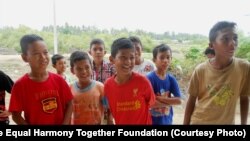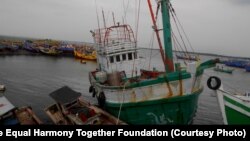Indonesia’s Aceh province is taking a prominent role in assisting hundreds of Asia boat people who have settled in temporary refugee camps after a perilous journey by sea. Humanitarian and relief workers say more Rohingya are likely to risk similar voyages in the months ahead, including after the Muslim holy month of Ramadan.
In Indonesia’s northern Aceh province some 2,000 refugees from Bangladesh and ethnic Muslim Rohingya from Myanmar are encamped after being rescued at sea by local fishermen. Under a regional agreement, the Rohingya will be able to remain at the camp for a year, while the Bangladeshis will be returned to their home country.
For the Rohingya, Aceh was their last chance for refuge after they were abandoned by human smugglers at sea.
Lillian Fan, a humanitarian worker and researcher who also works in Aceh, said it was only the local fishermen that were willing to come to the rescue of the Rohingya.
“A place like Aceh, which itself is affected by 30 years of conflict, is probably the one place that’s really welcomed the Rohingya – really welcomed them with such humanitarian spirit. I have been incredibly disappointed with the actors in this region - international, regional, national – in terms of the complete lack of ability to respond to save lives at risk,” said Fan.
The people of Aceh are no strangers to hardships. The province faced 30 years of separatist violence and in 2004 was the epicenter of the Indian Ocean earthquake and tsunami that together claimed up to 150,000 Indonesian lives in Aceh alone.
Fan said the fishermen defied officials, who told them not to intervene, and instead went to the rescue of the boat people. The Indonesian navy, she said, initially punished the fishermen by grounding some of their boats and taking away their permits. But the fishermen continued to search.
“The bright spot has been the fact that ordinary people, fishermen actually fishermen and villagers and people who in Aceh in particular have themselves been victims of conflict, actually conducted not just rescue [but] search and rescue because they knew people were out there,” said Fan.
An increasing number of Muslim Rohingya have fled persecution, violence and ostracism in Myanmar’s Rakhine State, where they are largely stateless. The Rohingya’s increasing desperation has driven them to smugglers’ boats and tenuous journeys to reach Malaysia and Indonesia.
The first Rohingya vessel was recovered in eastern Aceh on May 10, the second on May 15. On that vessel, a lack of food reportedly led to violent fights between Rohingya and Bangladeshis. Humanitarian workers say several people were killed or seriously injured. The last vessel to be recovered in Aceh was on May 20.
The Indonesian government has supported the camps in Aceh province, disbursing $174,000 for the Bangladeshi and Rohingya. But is also has hopes for international support.
Htike Htike, a Rohingya humanitarian worker and cofounder of the Equal Harmony Together Foundation, said many refugees in the camps worry about their future and the family members they left behind.
“For the Rohingya, the [Indonesian] government said they have shelter for one year in Aceh. But still everyone would like to know what next for them. Either they will be deported to Burma again or they have an option to stay in Aceh or resettlement. So it’s always a common question for them,” said Htike.
Despite the perils, more Rohingya are likely to seek refuge in Indonesia. Htike said some women in the Aceh camps have husbands who left Myanmar in 2012 and 2013 and are believed to be living in Malaysia. They may try to travel to Aceh to rejoin their families after the Muslim holy month of Ramadan.
Others still left behind in Myanmar's Rakine State may also be looking to risk a journey during monsoon season, before the seas calm in October.
“They will want to reunion with the family member in Malaysia. Most of the women they have a husband in Malaysia. So the possibility the people again will be sailing after Ramadan. So they might join in coming, joining the family in Aceh from (Rakhine) Arakine State,” said Htike.
Rights workers say that without Myanmar taking steps to ease the plight of the Rohingya at home, more will be ready to take to the high seas in the months ahead.





